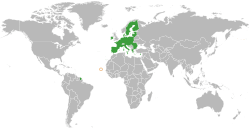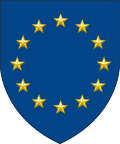Cape Verde–European Union relations
Cape Verde is an island nation, part of the Macaronesian group of islands of the Atlantic Ocean and was a former Portuguese colony during the colonial era between 1460 and 1975. EU-Cape Verde relations are founded on the EU/Cape Verde Special Partnership, agreed in 2007, building on six pillars;[1]
- Good governance
- Security/stability
- Regional integration
- Technical and Regulatory Convergence
- Knowledge-based Society
- The fight against poverty, and development.
 | |
EU |
Cape Verde |
|---|---|
 |
|---|
| This article is part of a series on the politics and government of Cape Verde |
|
Legislature |
|
Judiciary
|
|
|
Following that, an Action Plan for Security and Stability was launched in 2014 and a Mobility Partnership.
Cape Verde is a member of the Economic Community of West African States (ECOWAS),[2] an African regional bloc with aims for internal integration similar to those of the EU, and even though it has not yet participated in all of its activities, it cannot have membership in both organizations at the same time. It is also a member of the African Union, an organization aiming for a common currency in Africa, a single defense force for the African continent and an African Union head of state.
Recently, Cape Verde has been distancing itself from its regional African partners and forging closer ties with the EU. In a move signaling its preparation to loosen ties with the West African regional bloc, the government of Cape Verde in September 2006 declared its intentions on suspending the ECOWAS free movement of goods and trade. Prime Minister José Maria Neves announced that his country will start imposing restrictions on the entrance of citizens from all ECOWAS member states. The Cape Verde government soon will present ECOWAS with proposals for "special status" instead of full membership.[3] This is also an effort to limit the recent rise of illegal immigration of other West African nationals using Cape Verde and its proximity to the Canary Islands as a springboard towards Europe. Cape Verde is also a member of the Generalised System of Preferences with further incentives for good governance (GSP+).
Cape Verde is also one of the beneficiaries of the EU's regional cooperation programme with Portuguese-speaking African countries (PALOP) countries: Angola, Guinea Bissau, Cape Verde and São Tomé and Príncipe.[4]
Membership
In March 2005 former Portuguese president Mário Soares launched a petition urging the European Union to start membership talks with Cape Verde, saying the country could act as a bridge between Africa, Latin America and the EU.[5]
Cape Verde's per capita GDP is lower than any of the current member states, accession countries, or candidate countries. However, it is higher than that of some of the EU-designated "potential candidate countries" of the Western Balkans like Bosnia and Herzegovina. In terms of respect of democracy the Freedom house report ranks Cape Verde top in Africa[6] and again Cape Verde has a better ranking than that of some designated "potential candidate" of the EU: Bosnia and Herzegovina, Kosovo, and Albania.[7] Most of the imports and exports of Cape Verde are for and from the European Union, and it has a service-based economy. Its currency, the escudo, is pegged to the euro.[8][9]
Although the Cape Verde archipelago is geographically in Africa, there have been similar situations before. Cyprus is an island nation that, despite being geographically in Asia, has already joined both the Council of Europe and the EU. Furthermore, the Cape Verde islands are part of the same island group as the Canary Islands (part of Spain), Madeira Islands (part of Portugal) and Azores Islands (part of Portugal), known as Macaronesia. There is currently no political recognition by the EU of Cape Verde as a European state, but unlike in the case of Morocco, there is no formal rejection either.
Complementing Cape Verde's efforts to join the EU, the Macaronesian group of islands (the Azores, Madeira, and the Canary Islands) are throwing their support for their regional brethren.[10] The Atlantic group of islands are pushing for an entrance of Cape Verde into the EU under a special status.[11]
References
- "Cabo Verde and the EU - EEAS - European External Action Service - European Commission".
- "afrol News - Cape Verde wants special status at ECOWAS". Afrol.com. Retrieved 2016-10-01.
- "Cape Verde - International Cooperation and Development - European Commission". 2013-06-17. Retrieved 2017-03-07.
- "Archived copy". Archived from the original on 2005-06-23. Retrieved 2007-11-02.CS1 maint: archived copy as title (link)
- "Archived copy". Archived from the original on 2007-10-08. Retrieved 2007-08-02.CS1 maint: archived copy as title (link)
- "Archived copy". Archived from the original on 2008-12-19. Retrieved 2007-08-02.CS1 maint: archived copy as title (link)
- (PDF) http://portal.fe.unl.pt/FEUNL/bibliotecas/BAN/WPFEUNL/WP2006/wp494.pdf. Retrieved 2007-08-02. Missing or empty
|title=(help) - "Archived copy" (PDF). Archived from the original (PDF) on 2007-09-28. Retrieved 2007-08-02.CS1 maint: archived copy as title (link)
- "Cape Verde: Cape Verde Islands". Caboverde24.com. Retrieved 2016-10-01.
- "afrol News - EU, Cape Verde display different interests in integration". Afrol.com. Retrieved 2016-10-01.
